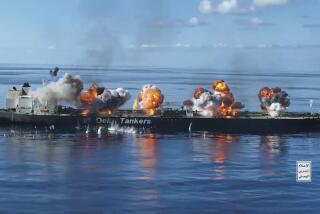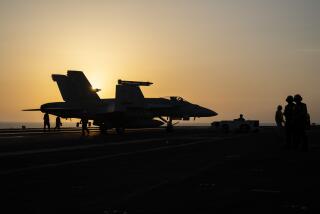FBI investigates 4 U.S. hostagesâ deaths in Somali pirate hijacking
Reporting from Jerusalem â As FBI agents on Wednesday began investigating the deaths of four Americans whose yacht was hijacked by Somali pirates in the Arabian Sea, U.S. officials were mulling whether to bring captured suspects to America to face justice.
FOR THE RECORD:
Hostages killed: In the Feb. 24 Section A, the photo accompanying an article about the U.S. investigation into the killings of four Americans whose yacht had been hijacked by Somali pirates was credited to AFP/Getty Images. Although transmitted by the wire service, the photo was provided by the Del Rey Yacht Club and taken by club member Joan Godfrey. â
Fifteen Somalis â as well as the bodies of the four Americans and four Somalis â remained aboard the aircraft carrier Enterprise off the coast of Oman, where the high-seas hijacking ended tragically Tuesday with the shooting deaths of two couples, Jean and Scott Adam of Marina del Rey and Phyllis Macay and Robert Riggle of Seattle. The U.S. military says Navy SEALs boarded the yacht after pirates fired a rocket-propelled grenade at an American warship following it, and that they found the four hostages already shot.
Legal experts predicted that the Justice Department would move to bring the pirates to the U.S. for trial.
âThe fact that there are four dead Americans will make the U.S. more interested in taking this case, rather than referring it to a foreign country,â said Michael Passman, a Chicago attorney who has written about piracy law. âThe U.S. may try to use this case as an example to show that they remain committed to anti-piracy.â
In recent years, the U.S. has tried several Somali pirates who have been captured as part of an international campaign to halt the surge in hijackings off Somaliaâs coast.
Last week, a Somali man who pleaded guilty to the April 2009 attack against the Maersk Alabama container ship in the Indian Ocean received more than 33 years in a U.S. prison.
Under federal law, the maximum penalty for piracy is life imprisonment, but because the hijacking ended in hostage fatalities â a rarity in Somali pirate attacks â U.S. prosecutors might opt for murder charges instead, Passman said.
U.S. military officials said no decisions have been announced about where the suspects will be prosecuted, but that one option is extraditing the men to the U.S.
âThis happened in international waters, so they have to go somewhere,â said Lt. Col. Mike Lawhorn, spokesman for U.S. Central Command in Florida. âThe fact that this involved Americans gives us some jurisdiction. We have the right to protect our own citizens.â
In previous piracy attacks, U.S. officials have referred prosecutions to Kenya, but the East African nation has complained that it lacks the resources and laws to handle piracy cases, which are often complex and lengthy. In some cases, pirates have received relatively light sentences.
FBI investigators are trying to determine how the hijacking turned deadly.
According to one account, two rival groups of pirates may have disagreed over whether to accept an offer being made during negotiations with the U.S. Navy, which had been shadowing the 58-foot yacht since it was hijacked Friday. During the alleged dispute, one faction began shooting the hostages, according to a source close to the Somali hijackers.
In another version, pirates have claimed that they killed the hostages in response to a surprise raid by U.S. forces.
An FBI spokesman in Washington declined to comment.
More to Read
Sign up for Essential California
The most important California stories and recommendations in your inbox every morning.
You may occasionally receive promotional content from the Los Angeles Times.










